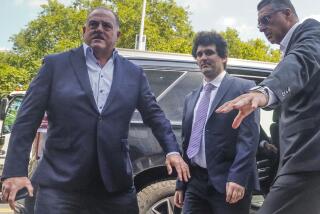Murder, Racketeering Charged in Trial of ‘Mild-Mannered’ Lawyer
- Share via
BIRMINGHAM, Ala. — He was a “wolf in sheep’s clothing,” a mild-mannered lawyer and part-time judge whose veneer of respectability hid a sordid underworld existence involving drugs, money laundering, torture and murder.
That’s how federal prosecutors Friday described Fredric W. Tokars, once an up-and-coming member of Atlanta’s legal and political community who is now on trial on racketeering charges.
Among the crimes he is accused of committing is the 1992 murder of his wife. Sara Tokars was shot down in front of her two young boys by a hit man who said that he was hired indirectly by Fredric Tokars.
She was killed because she had discovered--at a time when her husband was under federal investigation--evidence of his involvement in tax evasion and money laundering, Assistant U.S. Atty. Wilmer Parker told the jury in his opening statement.
Tokars used his expertise in accounting and offshore banking to conceal millions of dollars in drug money for violent cocaine traffickers with connections in Detroit, Los Angeles and Miami, Parker said. He described Sara Tokars, who had wanted a divorce, as “a ticking time bomb” because of what she knew about him.
In all, eight men were indicted on racketeering charges. Four have pleaded guilty to drug-related charges and are set to testify against Tokars. A separate trial on the murder charge will be held later.
The racketeering trial for Tokars and another defendant, James Mason, was moved to Birmingham because the case has been so heavily covered by the Atlanta media. Defense lawyers argued it would be impossible to seat an impartial jury in Atlanta.
Selecting a jury was difficult even in Alabama, in part because the case--the subject of book and movie deals--has been publicized nationally.
The media feeding frenzy figures into Tokars’ defense.
The case became a “spectacular media show” that the police and Sara Tokars’ family exploited to ruin Tokars, said Jerome Froelich, one of Tokars’ attorneys. The family’s motive was to get custody of the two children, he said. In addition, one of Sara Tokars’ sisters was “out to get” Tokars for revealing that she had had an abortion and a venereal disease, the lawyer said.
At the height of the media coverage, one Atlanta television reporter and anchorman was fired after it was disclosed that he had entered into a partnership with several news sources to sell movie rights. Movie producers would pay more money if Tokars were found guilty, so the reporter aired negative stories and sought out witnesses who could implicate Tokars in wrongdoing, Froelich said.
The publicity, which Froelich alleged was fed by police department leaks, caused other witnesses to have “sudden revelations” and to come forward months after the murder so that they too could “become heroes,” he said.
While prosecutors portrayed Tokars’ associations with drug dealers and his legal activities in their behalf as sinister, Froelich tried to put an innocent face on it: “When you’re a criminal defense lawyer, you meet people who have problems, you meet people who deal drugs, you meet people who pay in cash.”
He described Tokars as a hard-working, naive, white attorney who was taken in by a black “con man of con men” named Eddie Lawrence, with whom Tokars became business partners for the purpose of making inroads into the African American community. The lawyer suggested that Lawrence had Sara Tokars killed because of disagreements he had had with Tokars over their businesses.
The two men were partners in a number of businesses, including a home remodeling business and real estate company.
Waving a giant photograph of the Georgia electric chair, Froelich told the jury that Lawrence, a key witness against Tokars, is lying to avoid the death penalty. “He doesn’t ride the lightning if he can do one thing--give (the authorities) Fred Tokars,” Froelich said.
More to Read
Sign up for Essential California
The most important California stories and recommendations in your inbox every morning.
You may occasionally receive promotional content from the Los Angeles Times.













